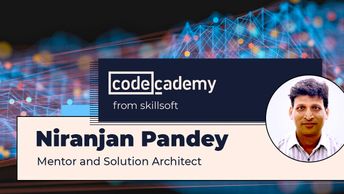This 12-video course explores essential phases of machine learning (ML), deep learning workflows, and data workflows that can be used to develop ML models. You will learn the best practices to build robust ML systems, and examine the challenges of debugging models. Begin the course by learning the importance of the data structure for ML accuracy and feature extraction that is wanted from the data. Next, you will learn to use checklists to develop and implement end-to-end ML and deep learning workflows and models. Learners will explore what factors to consider when debugging, and how to use flip points to debug a trained machine model. You will learn to identify and fix issues associated with training, generalizing, and optimizing ML models. This course demonstrates how to use the various phases of machine learning and data workflows that can be used to achieve key milestones of machine learning projects. Finally, you will learn high level-deep learning strategies, and the common design choices for implementing deep learning projects.
| Objectives |
|---|
ML/DL Best Practices: Machine Learning Workflow Best Practices
|


